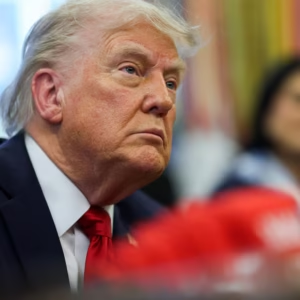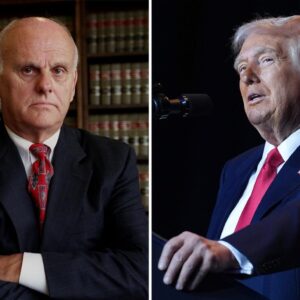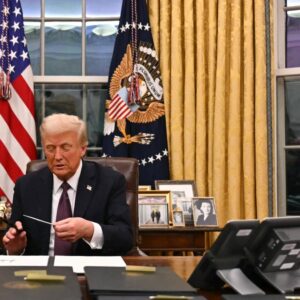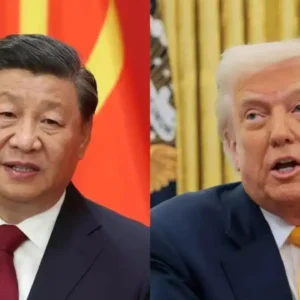In the United States of America, we pride ourselves on being a republic — a nation where the people elect leaders who make decisions on their behalf. That’s why we have elections. That’s why we vote. And in 2016 and again in 2020, tens of millions of Americans voted for Donald J. Trump to be President of the United States. He was our choice. Our voice.
Yet today, more than ever, it seems like the people’s voice is being drowned out — not by Congress, not even by the White House, but by a powerful minority of unelected, activist federal judges who are rewriting laws from the bench. These judges weren’t chosen by the people. They weren’t on a ballot. But somehow, they’re calling the shots on everything from immigration policy to abortion, to the regulation of firearms and even the ability of a sitting president to carry out his constitutional duties.
It raises a simple question: If we live in a representative democracy, why are so many decisions being made by people we never elected?
The Rise of the Judicial Activist
Let’s be clear: the Constitution gives judges real power. It gives them the authority to interpret the law, not to make it. Yet in recent years, we’ve seen a dangerous trend where judges — especially in the federal district and appeals courts — are actively shaping policy. They’re not interpreting the Constitution; they’re twisting it to fit their own political views.
Think about the Trump-era immigration policies. Over and over again, activist judges blocked them — from the travel ban to asylum restrictions — long before the Supreme Court could weigh in. In many cases, the judges didn’t just question the legality of the executive orders; they inserted their own political ideology and assumptions about what they thought the law should say.
This is not how a republic functions. This is not how checks and balances are supposed to work.
Who Are These Judges Answerable To?
The scariest part? These judges are appointed for life. Once they’re confirmed, they don’t face re-election. They’re not held accountable by voters. They’re shielded from consequences. And many of them are more than willing to wield their power to undermine a president they personally disagree with.
The irony is sharp: these same judges preach about “preserving democracy,” but by overriding the will of elected leaders and the voters who put them in office, they’re doing the opposite.
When Trump supporters say “we voted for him,” it means we voted for his agenda — his border policies, his judges, his America First trade strategy. But time and time again, unelected federal judges have tried to stop him from doing the very things we elected him to do.
Weaponizing the Courts
It’s not just about decisions anymore — it’s about politics. We’re seeing entire lawsuits strategically filed in specific districts with known liberal judges to get nationwide injunctions. This tactic, called “forum shopping,” is designed to stop Trump policies in their tracks before they can even be implemented. And it works — at least in the short term.
How is this fair? How is it democratic that a single judge in California or Washington, D.C. can block federal policy supported by tens of millions of Americans?
Let’s not forget: in 2023, a single district court judge attempted to override federal drug policy by suspending FDA approval of a decades-old abortion pill. Whether you agreed with the ruling or not, the case raised a deeper issue: one unelected judge can disrupt national health policy or immigration enforcement, simply because he or she feels like it.
Is this what the Founding Fathers envisioned?
President Trump’s Judicial Legacy
One of President Trump’s greatest accomplishments — and one that doesn’t get nearly enough credit — was reshaping the judiciary. He appointed over 230 federal judges during his first term, including three Supreme Court Justices: Neil Gorsuch, Brett Kavanaugh, and Amy Coney Barrett.
These were not activist judges. These were constitutionalists — judges who respect the limits of the judiciary and the powers of the people’s representatives. Trump understood what was at stake. He knew the importance of appointing judges who interpret the law, not invent it.
But even now, the judiciary remains filled with Obama-era and Clinton-era judges, many of whom still view Trump’s America First agenda with contempt. They’re not just disagreeing with his policies — they’re trying to stop them outright.
What Needs to Change?
If we want to preserve the will of the voters, something has to give. Here are a few ideas:
- End Nationwide Injunctions: No single judge should have the authority to block policy nationwide. Let decisions apply locally unless the Supreme Court says otherwise.
- Term Limits for Federal Judges: Lifetime appointments give judges far too much unchecked power. It’s time to consider reasonable term limits — say, 18 years — to restore accountability.
- Judicial Impeachment and Oversight: Activist judges who repeatedly overstep their bounds should face consequences. Congress has the power to impeach judges, and it should not be afraid to use it when necessary.
A Battle Bigger Than Trump
This is bigger than Donald Trump. This is about preserving the idea that we the people still have a say. That our votes matter. That the men and women we send to Washington are the ones who get to make the laws — not unaccountable judges in black robes with a political agenda.
The elite left talks endlessly about “threats to democracy.” But what bigger threat is there than stripping power away from the people and giving it to an unelected minority?
In 2016, the American people voted to shake up the system. In 2020, we reaffirmed that vision. We chose a president who promised to put America first, to secure our borders, to defend life, liberty, and the Constitution. And yet, time and again, that vision has been challenged — not at the ballot box, but in the courtroom.
Conclusion: Our Vote Still Matters
We didn’t vote for activist judges. We didn’t vote for ideological interference. We voted for a president who stood up to the establishment, who challenged the system, and who gave a voice back to ordinary Americans.
It’s time the courts remembered their place. It’s time the bench stopped playing politician. And it’s time we — the people — demand a judiciary that respects our voice, our vote, and our Constitution.
Because in the end, we are still a government of the people, by the people, and for the people.
And we voted for President Trump.






